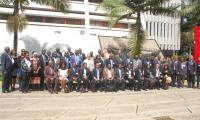African Court takes steps to further access to remedy

It is too difficult for Africans who cannot afford legal representation to have their cases handled by the African Court on Human and Peoples' Rights. Therefore, the Court has begun to explore the possibility of establishing a legal aid fund to provide support for future plaintiffs.
The first step was taken during a workshop in Arusha, Tanzania in June. The Court invited the Danish Institute for Human Rights to take part in the work of carving out the principles for a future legal aid fund.
- We were pleased that the African Court was so interested in our ideas that they asked the Danish Institute to submit further input in writing, not just on the Legal Aid Fund but also on the Court’s Legal Aid Policy, says Karol Limondin who represented the Danish Institute at the workshop.
Difficult to go to court
The African court can be seen as a sister institution to the European Court of Human Rights and has since its establishment in 2006 handled 29 cases. But it is a wide spread wish that the court should handle more and more principal cases. An important measure could be setting up a legal aid fund.
-From our work on legal aid in countries such as Rwanda, Zambia and Mali, we know how difficult it is for most people in Africa to go to court. One problem is that the cost of legal representation is prohibitive for most people. Setting up a fund that can pay for legal representation will be a key step in making the African Court truly accessible to ordinary Africans, Karol Limondin explains.
Read more about our activities in West Africa, Southern Africa and in North Africa.
The legal aid fund should consider not only the financial means of the parties but also the public interest of the matter.
It should be made accessible to ordinary people on the ground.
It should encourage collaboration between legal aid providers.
